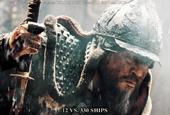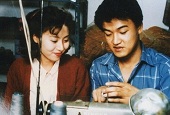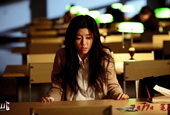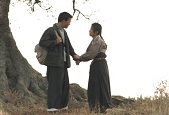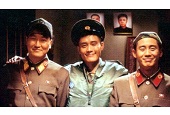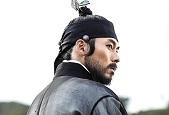"The spirit is admiral Yi Sun-sin who sacrifices his life and devotes himself is something people around the world can emulate from."
So said Kim Han-min, the director of "The Admiral: Roaring Currents," in a meeting with moviegoers held on August 21 to mark the passing of 16 million in ticket sales.
"Sixteen million is an incredible number," Kim said. "I can't thank you enough. Thank you so much," Kim said. He also said admiral Yi united Korean people in difficult times and led them to victory. He described Yi as "an icon of unity and harmony."
Viewers asked a series of questions one after another. A middle-aged man said he was able to emulate Yi's courage to get through a surgery. Then, he handed a letter he personally wrote to Kim. In return, the director gave the viewer a book about admiral Yi.
The film "The Admiral: Roaring Currents," which set a record on August 19 since its release 21 days ago, is about a sea battle victory in 1597, the 30th year of King Seonjo's reign. Yi had only 12 war ships but beat the Japanese navy who had over 300. Of the 128 minutes of running time, the battle scenes lasted as long as 61 minutes, and were just spectacular and absolutely breathtaking.
Kim, who directed "War of the Arrows" (2011), a film about a 17th-century war between Joseon and China, has had admiral Yi on his mind for a long time. Born in Suncheon, Jeollanam-do (South Jeolla Province), he has seen many relics related to Yi in his hometown and gotten interested in his story. The film narrates the history in which admiral Yi accomplished one of the biggest victories of the war despite the fact that it was also the most difficult time in his life.
Kim said he hopes to make films about other sea battles led by admiral Yi and said his next film is likely to be a historical drama.
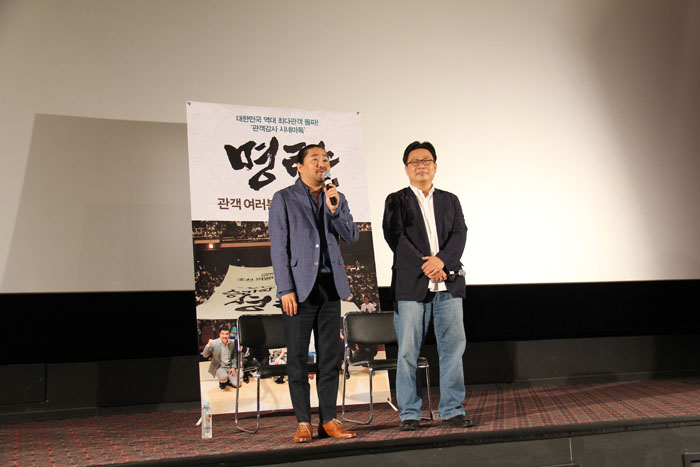
- The film is well received overseas including a favorable review in the LA Times. How do you feel?
- It happened so quickly and I don't feel like it is real. Maybe I could realize it later. Many Koreans revere and love him. There is even his statue in Sejong-no street, the heart of Seoul. I thought if people across the world learn about Yi Sun-sin through the film, they will be able to deeply sympathize with and love him. Yi could also become their role model.
- In which countries is the film going to be released?
- The film is now shown in Indonesia and it will also be released in Britain, France and Japan. I made a joke to actor Choi Min-sik that he should make an appearance in front of Japanese audiences when it is released in the neighboring country. Then, he answered that I should go there alone. A person in Japanese film distribution said as the story is probable and makes sense, it will likely be released in Japan as well. If it is released in Japan, it would be very meaningful. We will see how it goes.
- Is there a particular country in which you want the film to be released?
- I hope it will be released in North Korea. Admiral Yi is an icon of unity and harmony. There are many social and regional conflicts these days and unity and harmony are something we need most today. So I put in a line at the end of the movie: "How would we resolve so many grudges?" I believe we feel the same way about unity and harmony between South and North Korea. A while ago, I watched a North Korean film on admiral Yi and it was similar to a South Korean counterpart about the general. I think both South and North Koreans admire Yi in a similar manner.
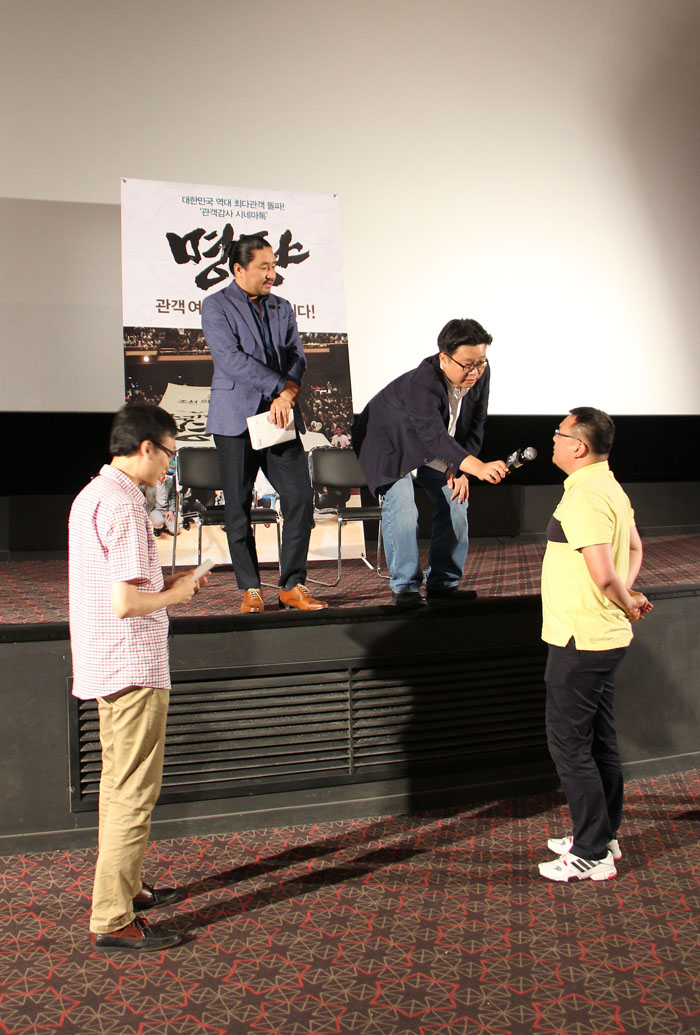
- The turtle ship in the film is not a steel-made vessel. Why?
The turtle ship in the film is not a steel-made vessel but a wooden ship with steel spikes on the surface. There are many theories on turtle ships and I had to make a choice myself. Someone advised me that a turtle ship needs to be smaller than the panokseon, the most prevalent type of battle ship in Joseon, and that if it was made of steel, it would have been too heavy to be used as an assault ship. There are many different opinions among scholars but more theories tell me that turtle ships were made of wood and had steel spikes on the surface.
- What does a sense of loyalty mean to you?
- In Chinese characters, loyalty (忠) consists of center (中) and heart (心). It means something you care for and love most. Among all, admiral Yi loved his country and countrymen most. Admiral Yi fought in a war as an enlisted man twice because his title was taken away. He served in a war as a commoner in Hamgyeong-do (Hamgyeong Province). He passed the military service examination relatively later than other people. I think it is attributed to an experience he had when he was young. I believe he stuck to his principles and loved his countrymen with such generosity and all this came from a sense of loyalty. I wrote a line with confidence that "a sense of loyalty is geared toward people, not the king."
- According to the war diary written by admiral Yi, there was no close combat on the flagship. The floor of the panokseon is quite high and there could not be a hand-to-hand fight. There are many scenes in the film different from historical scenes.
- It is encouraging that people have an interest in history. A love of history is great. The ship with admiral Yi probably did not have a hand-to-hand fight. But there might be one in three ships surrounding the ship in which admiral Yi was riding. I wanted to make the film more dramatic so I created close combat scenes with admiral Yi's ship.
- Which aspect of admiral Yi do you want to promote in a historical point of view?
- I want to emphasize admiral Yi's strong spirit. The sea battle in which admiral Yi with only 12 ships beat the Japanese navy with over 300 ships is the one and only. They did not receive the full support from the government but it was salvation by their own effort. People across the world can emulate admiral Yi's spirit as he sacrificed and devoted himself though he was subject to jealousy and hate.
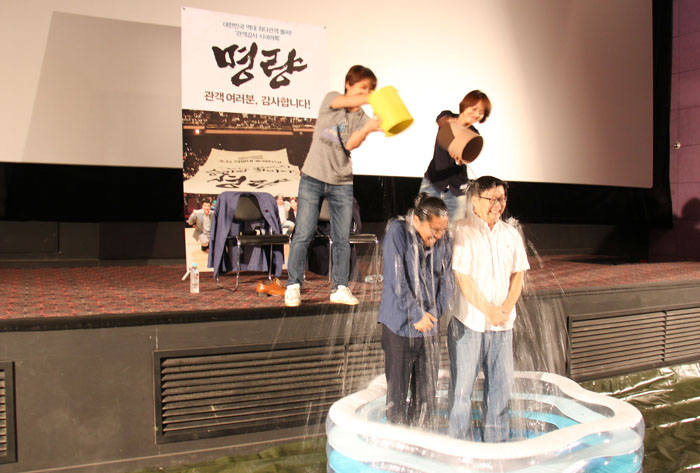
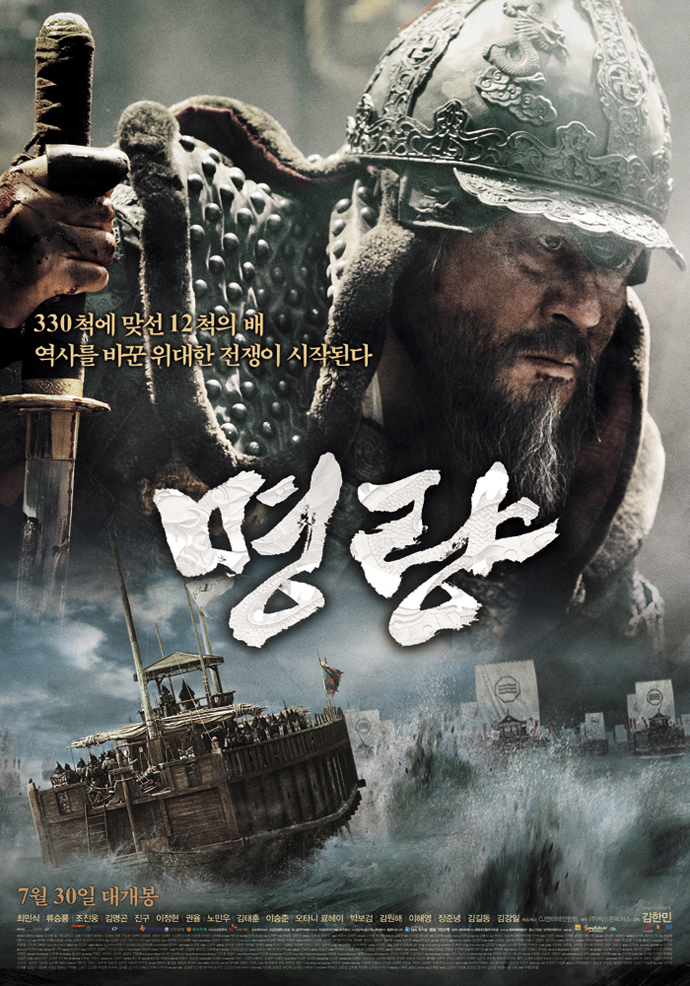
Article, photographs by Limb Jae-un
Korea.net Staff Writer
jun2@korea.kr
So said Kim Han-min, the director of "The Admiral: Roaring Currents," in a meeting with moviegoers held on August 21 to mark the passing of 16 million in ticket sales.
"Sixteen million is an incredible number," Kim said. "I can't thank you enough. Thank you so much," Kim said. He also said admiral Yi united Korean people in difficult times and led them to victory. He described Yi as "an icon of unity and harmony."
Viewers asked a series of questions one after another. A middle-aged man said he was able to emulate Yi's courage to get through a surgery. Then, he handed a letter he personally wrote to Kim. In return, the director gave the viewer a book about admiral Yi.
The film "The Admiral: Roaring Currents," which set a record on August 19 since its release 21 days ago, is about a sea battle victory in 1597, the 30th year of King Seonjo's reign. Yi had only 12 war ships but beat the Japanese navy who had over 300. Of the 128 minutes of running time, the battle scenes lasted as long as 61 minutes, and were just spectacular and absolutely breathtaking.
Kim, who directed "War of the Arrows" (2011), a film about a 17th-century war between Joseon and China, has had admiral Yi on his mind for a long time. Born in Suncheon, Jeollanam-do (South Jeolla Province), he has seen many relics related to Yi in his hometown and gotten interested in his story. The film narrates the history in which admiral Yi accomplished one of the biggest victories of the war despite the fact that it was also the most difficult time in his life.
Kim said he hopes to make films about other sea battles led by admiral Yi and said his next film is likely to be a historical drama.

Director Kim Han-min (left) of "The Admiral: Roaring Currents" and Seo Kyoung-duk, a professor at Sungshin Women's University, who presides over the meeting, on August 21.
- The film is well received overseas including a favorable review in the LA Times. How do you feel?
- It happened so quickly and I don't feel like it is real. Maybe I could realize it later. Many Koreans revere and love him. There is even his statue in Sejong-no street, the heart of Seoul. I thought if people across the world learn about Yi Sun-sin through the film, they will be able to deeply sympathize with and love him. Yi could also become their role model.
- In which countries is the film going to be released?
- The film is now shown in Indonesia and it will also be released in Britain, France and Japan. I made a joke to actor Choi Min-sik that he should make an appearance in front of Japanese audiences when it is released in the neighboring country. Then, he answered that I should go there alone. A person in Japanese film distribution said as the story is probable and makes sense, it will likely be released in Japan as well. If it is released in Japan, it would be very meaningful. We will see how it goes.
- Is there a particular country in which you want the film to be released?
- I hope it will be released in North Korea. Admiral Yi is an icon of unity and harmony. There are many social and regional conflicts these days and unity and harmony are something we need most today. So I put in a line at the end of the movie: "How would we resolve so many grudges?" I believe we feel the same way about unity and harmony between South and North Korea. A while ago, I watched a North Korean film on admiral Yi and it was similar to a South Korean counterpart about the general. I think both South and North Koreans admire Yi in a similar manner.

A viewer who takes part in the meeting says, 'I could see the courage that defies fear in the movie. This is my fifth viewing. I came here to deliver a letter of gratitude.'
- The turtle ship in the film is not a steel-made vessel. Why?
The turtle ship in the film is not a steel-made vessel but a wooden ship with steel spikes on the surface. There are many theories on turtle ships and I had to make a choice myself. Someone advised me that a turtle ship needs to be smaller than the panokseon, the most prevalent type of battle ship in Joseon, and that if it was made of steel, it would have been too heavy to be used as an assault ship. There are many different opinions among scholars but more theories tell me that turtle ships were made of wood and had steel spikes on the surface.
- What does a sense of loyalty mean to you?
- In Chinese characters, loyalty (忠) consists of center (中) and heart (心). It means something you care for and love most. Among all, admiral Yi loved his country and countrymen most. Admiral Yi fought in a war as an enlisted man twice because his title was taken away. He served in a war as a commoner in Hamgyeong-do (Hamgyeong Province). He passed the military service examination relatively later than other people. I think it is attributed to an experience he had when he was young. I believe he stuck to his principles and loved his countrymen with such generosity and all this came from a sense of loyalty. I wrote a line with confidence that "a sense of loyalty is geared toward people, not the king."
- According to the war diary written by admiral Yi, there was no close combat on the flagship. The floor of the panokseon is quite high and there could not be a hand-to-hand fight. There are many scenes in the film different from historical scenes.
- It is encouraging that people have an interest in history. A love of history is great. The ship with admiral Yi probably did not have a hand-to-hand fight. But there might be one in three ships surrounding the ship in which admiral Yi was riding. I wanted to make the film more dramatic so I created close combat scenes with admiral Yi's ship.
- Which aspect of admiral Yi do you want to promote in a historical point of view?
- I want to emphasize admiral Yi's strong spirit. The sea battle in which admiral Yi with only 12 ships beat the Japanese navy with over 300 ships is the one and only. They did not receive the full support from the government but it was salvation by their own effort. People across the world can emulate admiral Yi's spirit as he sacrificed and devoted himself though he was subject to jealousy and hate.

Director Kim Han-min (left) and professor Seo Kyoung-duk shower with ice water in an "ice bucket challenge" designed to fight Lou Gehrig's disease.

A poster of "The Admiral: Roaring Currents." (image courtesy of Two Rabbits)
Article, photographs by Limb Jae-un
Korea.net Staff Writer
jun2@korea.kr
